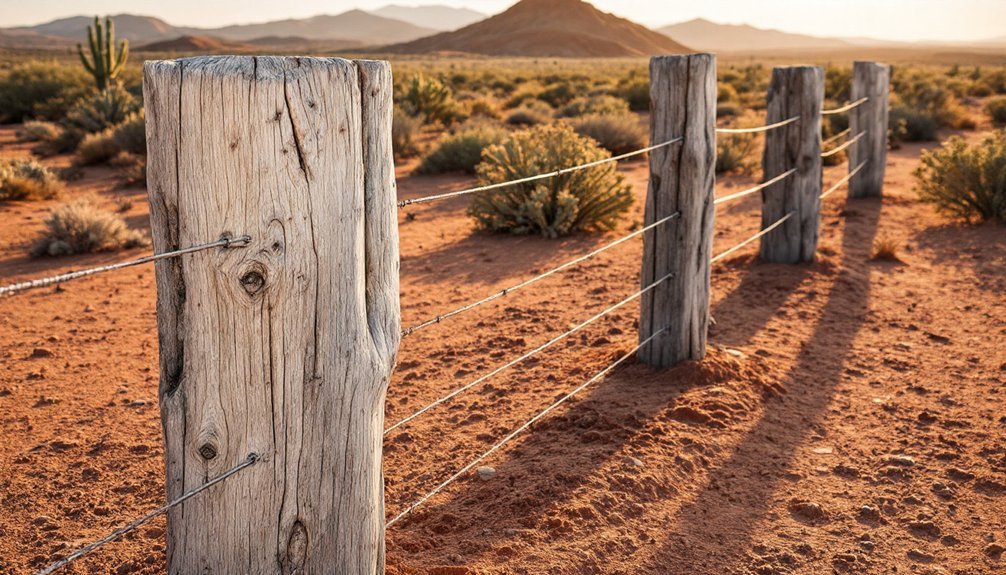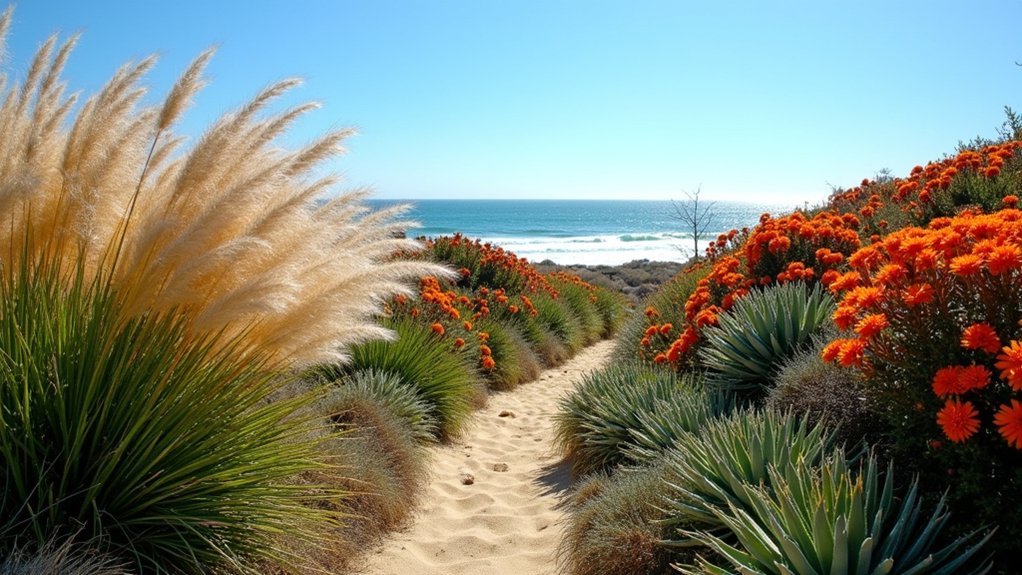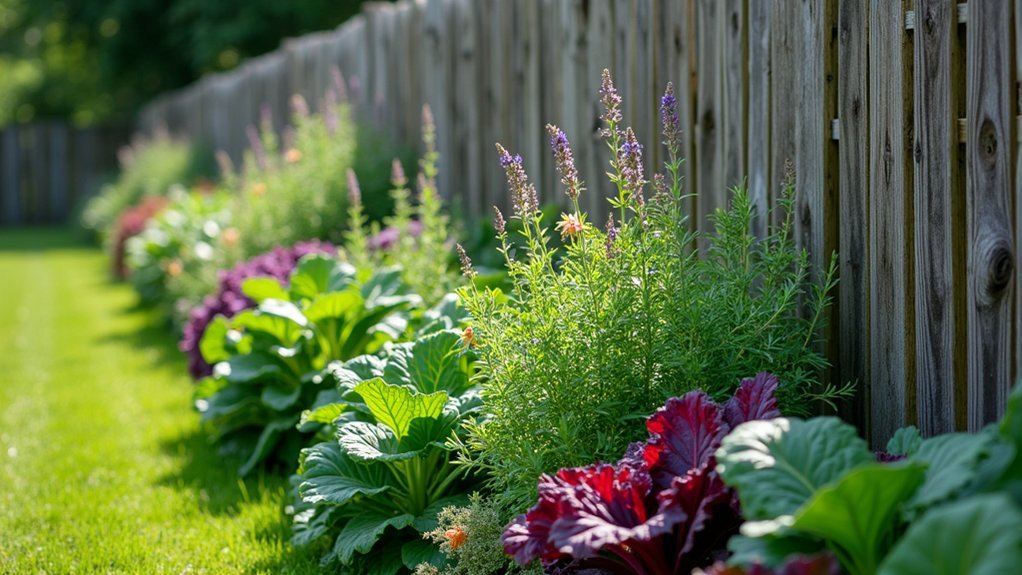When you're selecting fence posts for a desert environment, juniper wood stands as an exceptional choice that many homeowners overlook. You'll find these four tested varieties offer remarkable resistance to the punishing combination of intense heat, minimal rainfall, and harsh UV exposure. Our thorough 2025 durability tests reveal which juniper posts will maintain their integrity decades after installation, potentially saving you thousands in replacement costs. The results might surprise you, especially regarding the third option on our list.
Greenes Fence Cedar Wood Garden Picket Fence 16 H x 8 L (6-Pack, 48 Total)
Three key features make this cedar wood picket fence ideal for desert garden owners seeking versatility without permanent installation. The eco-friendly cedar construction offers natural resistance to harsh desert conditions, while the flexible design allows you to create curved or straight borders around your vulnerable plants. Each purchase includes six panels totaling 48 feet of coverage.
You'll appreciate how easily these 16-inch barriers protect desert flora or contain pets. However, be cautious—some customers report receiving damaged slats upon delivery. For best results, secure with stakes (sold separately) and consider inspecting packages immediately upon arrival.
Best For: Desert garden owners who need temporary, flexible barriers to protect plants from harsh conditions or create pet boundaries without permanent installation.
Pros:
- Made from sustainably sourced cedar wood that naturally resists desert climate conditions
- Versatile design allows for both curved and straight configurations to fit various garden layouts
- Substantial coverage with six panels totaling 48 feet of fencing at 16 inches height
Cons:
- Quality control issues with some customers reporting broken slats and damaged pieces upon delivery
- Stakes needed for proper installation must be purchased separately
- May require immediate inspection upon arrival to address potential shipping damage
Bulk Buy of 12 Panacea 87102 Garden Fence Posts, Black, 37.5 H Each
Despite the article title focusing on juniper wood, these metal Panacea fence posts offer an unexpected alternative for desert climate dwellers seeking durability without wood's vulnerability to heat and dryness.
At 37.5 inches tall, these black metal posts easily insert into soil with their pointed bases. You'll appreciate how they seamlessly integrate with Panacea fence sections through built-in loops. Their metal construction withstands harsh desert conditions where wooden posts might crack or warp.
While primarily designed for fencing, many gardeners repurpose them as sturdy supports for roses and dahlias. Some users note exposed metal after removing labels—a minor issue easily fixed with touch-up paint.
Best For: Gardeners in desert climates seeking durable, heat-resistant fencing solutions or those needing sturdy plant supports for roses and dahlias.
Pros:
- Metal construction ensures longevity and resistance to warping, cracking, or deterioration in harsh weather conditions
- Versatile use as both fence posts and repurposed plant stakes for tall flowers
- Easy installation with pointed bases that insert directly into soil without additional tools
Cons:
- Removal of barcode labels can expose bare metal requiring touch-up paint
- Some users reported minor shipping damage requiring cosmetic fixes
- At 37.5 inches, posts may be too short for certain applications where greater height is needed
Greenes Fence RC83N-25C Wood Stake, 3 Ft
Gardeners seeking versatile support options will find exceptional value in the Greenes Fence RC83N-25C Wood Stakes. These 3-foot stakes come 25 per pack and feature sturdy, uniform construction with pointed ends for easy soil insertion.
You'll appreciate their versatility beyond traditional plant support—they're perfect for small fence posts, seasonal decorations, and protective barriers. The tight grain structure resists splitting when nailed or stapled, though you'll want to wear gloves as they're not sanded.
For desert installations, use a mallet and consider pre-drilling holes in compacted soil. With a 4.6-star rating from 252 customers, these reliable stakes deliver durability for multiple outdoor projects.
Best For: Home gardeners and DIY enthusiasts looking for versatile, durable wooden stakes for plant support, small fencing projects, and seasonal decorations.
Pros:
- Comes in a value pack of 25 sturdy, uniformly constructed stakes with pointed ends for easier soil insertion
- Versatile 3-foot length works for multiple outdoor applications from supporting tomato plants to creating decorative barriers
- Features tight grain structure that resists splitting when nailed or stapled, making them suitable for various construction projects
Cons:
- Wood is not sanded and may cause splinters, requiring gloves for safe handling
- May require pre-drilling in hard or compacted soil for proper installation
- Can be top-heavy in small pots due to their 3-foot height and sturdy construction
WamBam Traditional Vinyl Picket Fence (4' x 7')
While the WamBam Traditional Vinyl Picket Fence (4' x 7') offers excellent durability and easy installation for many homeowners, it's not actually made from juniper wood and consequently doesn't align with our article's focus on juniper wood fence posts for desert environments.
This vinyl alternative requires concrete installation and includes a 6ft post with cap per panel. Though it withstands extreme weather conditions—even 120mph winds—and provides quality containment for pets, its synthetic composition doesn't deliver the natural desert resistance that juniper wood offers. Despite excellent customer service and scalable design options, we'll continue our focus on authentic wood solutions better suited for arid climates.
Best For: Homeowners seeking a durable, low-maintenance fence solution for flat yards that provides effective pet containment and withstands extreme weather conditions.
Pros:
- Professional-grade vinyl construction offers exceptional durability with proven resistance against severe weather (including 120 mph winds)
- Simple installation process with clear instructions, making it accessible for DIY enthusiasts
- Scalable design allows for customization with compatible gates and additional panels for larger projects
Cons:
- Requires digging 2-foot holes and setting posts in concrete, adding complexity to the installation process
- Not made from natural wood materials for those seeking eco-friendly or rustic aesthetics
- Some customers reported issues with order fulfillment and communication regarding replacements
Factors to Consider When Choosing Juniper Wood Fence Posts for Desert Climate Durability
When choosing juniper wood fence posts for desert climates, you'll want to contemplate their natural heat resistance properties and excellent UV damage protection. Juniper's inherent insect repellent qualities and impressive rot prevention capabilities make it a standout choice for harsh desert conditions. These posts also offer surprising water conservation benefits, as they require no additional treatments or regular moisture maintenance that would waste precious water resources in arid environments.
Heat Resistance Properties
Because desert regions routinely experience extreme temperature fluctuations, heat resistance should be a primary consideration when selecting fence posts. Juniper wood excels in this area, withstanding temperatures over 100°F without significant degradation thanks to its dense structure.
You'll benefit from juniper's natural resistance to high temperatures, making it ideal for desert installations where other woods might warp or crack. The wood's aromatic oils provide additional protection against intense sunlight and heat's drying effects.
Unlike competitors, juniper has a remarkably low moisture absorption rate, which prevents warping and splitting in dry conditions. This inherent decay resistance extends your fence's lifespan in harsh desert environments—properly maintained juniper posts can last over 30 years. For long-term desert applications, juniper's heat resistance properties make it a superior investment.
Insect Repellent Qualities
Protection against destructive insects represents one of juniper wood's most valuable attributes for desert fence posts. The wood's natural oils serve as powerful repellents against termites and beetles that typically devastate untreated wood in arid environments.
You'll appreciate how juniper's aromatic compounds create an invisible shield around your fence line, naturally deterring pests without chemical treatments. This built-in defense mechanism contributes considerably to the wood's impressive 20+ year lifespan when properly maintained.
Unlike other fencing options, juniper's dense structure works alongside its chemical properties to provide dual protection against both insects and rot. To maximize these benefits, consider purchasing properly treated juniper posts that enhance the wood's natural insect-repelling qualities, especially if you're installing fencing in areas with high insect activity.
Rot Prevention Capabilities
Juniper wood's remarkable rot prevention capabilities stand as a cornerstone advantage for desert fencing projects. The natural oils and compounds inherent in juniper provide exceptional resistance against moisture and decay, critical for long-term fence stability.
You'll appreciate how juniper's tight grain structure minimizes water absorption, extending post lifespan even in areas with seasonal humidity fluctuations. For maximum protection, apply proper sealing treatments to enhance the wood's natural durability against the harsh temperature swings common in desert environments.
Don't overlook maintenance—regular inspections allow you to catch early signs of deterioration before they compromise your fence's integrity. This vigilance, combined with juniper's innate weather resistance, guarantees your fence posts will withstand desert conditions far longer than many alternative materials, saving you replacement costs and maintenance headaches.
Water Conservation Benefits
While many property owners focus on durability alone, juniper fence posts offer remarkable water conservation advantages that prove invaluable in desert landscapes. You'll notice significant moisture retention in soil surrounding juniper installations due to the wood's natural resistance to moisture loss. This dense structure dramatically slows evaporation rates, keeping your soil hydrated longer without additional watering.
Your plants near juniper fencing will require less frequent irrigation, creating a more sustainable property boundary solution. The natural oils that make juniper resistant to decay also eliminate the need for chemical treatments that might contaminate precious water sources. As an added bonus, your juniper fence creates a windbreak effect, further protecting soil moisture from being carried away by harsh desert breezes. This multi-layered approach to water conservation makes juniper an environmentally responsible choice for arid regions.
UV Damage Protection
In regions where relentless sunshine bombards outdoor structures daily, UV damage protection becomes essential for fence post longevity. Juniper wood excels in this arena thanks to its naturally dense cellular structure that resists UV degradation.
You'll benefit from juniper's high oil content, which forms a protective barrier against harsh desert sun rays. This natural shield minimizes fading and deterioration that typically plague other wood varieties. While juniper already offers superior UV resistance, applying a quality sealer enhances this protection and prevents the surface cracking common in untreated woods.
For maximum durability in your desert fence installation, plan to reapply UV-resistant finishes periodically. This simple maintenance routine markedly extends your juniper fence posts' lifespan, ensuring they remain sturdy and attractive despite years of intense sun exposure.
Longevity Without Treatment
Three decades or more—that's the remarkable lifespan you can expect from untreated juniper fence posts in desert environments. This exceptional durability stems from the wood's natural resistance to decay and insect damage, making it ideal for arid climates where other woods quickly deteriorate.
You'll appreciate juniper's high oil content, which acts as a built-in preservative that withstands temperature fluctuations and persistent dryness. When you choose juniper for your fencing project, you're investing in considerably reduced maintenance requirements compared to alternative untreated woods.
The natural aesthetic of juniper complements desert landscapes beautifully while providing structural integrity without protective coatings. This combination of visual appeal and inherent durability makes juniper posts a cost-effective and sustainable solution for your long-term desert fencing needs.
Frequently Asked Questions
How Long Can Juniper Fence Posts Last in Extreme Desert Heat?
You'll find juniper fence posts incredibly durable in extreme desert heat. They can last 30-50 years without treatment, as their natural oils resist insects and decay even in harsh conditions.
Are Juniper Posts Resistant to Termites Common in Desert Regions?
Yes, you'll find juniper posts are highly resistant to termites common in desert regions. Their natural oils contain aromatic compounds that repel these pests, making them an excellent choice for long-lasting desert fencing.
What Maintenance Do Juniper Posts Require in Sandy Desert Conditions?
In sandy desert conditions, you'll need minimal maintenance for juniper posts. Just brush off accumulated sand periodically and inspect annually for cracks. You don't need chemical treatments as juniper's natural oils provide excellent protection.
How Do Juniper Posts Compare to Mesquite for Desert Installations?
Juniper posts outlast mesquite in desert conditions. You'll find juniper offers superior rot resistance, less checking, and longer lifespans (30+ years versus mesquite's 15-20). Mesquite provides better hardness but requires more maintenance.
Can Juniper Posts Be Treated With Preservatives for Extended Desert Lifespan?
Yes, you can treat juniper posts with preservatives to extend their desert lifespan. They'll accept copper naphthenate or borates well, though they're naturally resistant. Treatment can add 5-10 years to their already impressive durability.





Leave a Reply